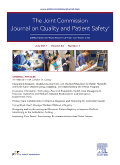
Joint Commission Journal on Quality and Patient Safety
Scope & Guideline
Driving impactful change in patient safety and healthcare delivery.
Introduction
Aims and Scopes
- Quality Improvement Initiatives:
The journal emphasizes research on quality improvement initiatives across various healthcare settings, showcasing effective strategies and interventions that enhance patient care and safety. - Patient Safety Practices:
A core focus of the journal is on patient safety, including studies that identify risks, evaluate safety protocols, and develop new frameworks to prevent adverse events in healthcare. - Healthcare Equity and Access:
The journal prioritizes research that addresses health disparities and promotes equitable access to quality care, highlighting initiatives aimed at improving outcomes for underrepresented populations. - Interprofessional Collaboration:
Research on teamwork and collaboration among healthcare professionals is a significant area of focus, exploring how interprofessional approaches can enhance patient safety and care quality. - Implementation Science:
The journal explores the application of implementation science to healthcare practices, assessing how evidence-based interventions can be effectively integrated into routine clinical settings. - Patient and Family Engagement:
Studies that examine the role of patient and family engagement in improving healthcare outcomes are a vital part of the journal's scope, focusing on strategies to involve patients in their care.
Trending and Emerging
- Digital Health and Technology Integration:
There is a significant increase in research focusing on the integration of digital health technologies, such as telehealth and electronic health records, to improve patient safety and care delivery. - Mental Health and Well-Being of Healthcare Workers:
Emerging studies emphasize the importance of clinician well-being and mental health, investigating how these factors impact patient care and safety, especially in the context of the COVID-19 pandemic. - Patient Safety Culture:
Research exploring the development and assessment of safety culture within healthcare organizations is gaining traction, highlighting the need for supportive environments that encourage reporting and learning from errors. - Health Equity Initiatives:
A growing body of work is dedicated to addressing health equity, focusing on interventions and policies that reduce disparities in healthcare access and outcomes for marginalized populations. - Innovative Education and Training Approaches:
There is an increased focus on innovative educational strategies, including simulation-based training and interprofessional education, aimed at enhancing the competencies of healthcare providers in patient safety practices.
Declining or Waning
- Traditional Quality Assurance Methods:
Research focusing solely on traditional quality assurance methods is becoming less prominent, as the field shifts towards more dynamic and integrated approaches emphasizing continuous improvement and innovation. - Generalized Patient Safety Reporting:
There is a noticeable decrease in studies that present generalized patient safety reporting without actionable insights or specific case studies, indicating a move towards more targeted and practical applications. - Isolated Interventions:
The journal has seen fewer articles that discuss isolated interventions without a systems approach, suggesting a growing recognition of the need for comprehensive strategies that consider the broader healthcare ecosystem.
Similar Journals

Journal of Healthcare Quality Research
Bridging gaps in health policy through comprehensive research.Journal of Healthcare Quality Research is an esteemed publication dedicated to advancing the field of health policy through rigorous research and comprehensive analysis. Published by ELSEVIER ESPANA SLU, this journal serves as a vital platform for researchers, professionals, and academics striving to address critical issues affecting healthcare quality across the globe. As a Q3 ranked journal in health policy for 2023, it holds a significant position within the Scopus rankings, showcasing its role in shaping healthcare discussions and policies. The E-ISSN: 2603-6479 reflects its commitment to wide accessibility, with an objective to provide insightful contributions that bridge gaps between theory and practice. With an impressive scope that spans from 2018 to 2024, the journal not only disseminates high-quality research but also fosters collaboration among policymakers and healthcare providers, driving innovations that enhance patient care and health systems worldwide.
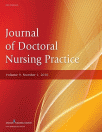
Journal of Doctoral Nursing Practice
Elevating healthcare through rigorous doctoral insights.The Journal of Doctoral Nursing Practice, published by SPRINGER PUBLISHING CO, serves as an essential platform for the dissemination of innovative research and best practices in nursing and health policy. With its ISSN 2380-9418 and E-ISSN 2380-9426, this journal is committed to advancing the field through rigorous peer-reviewed articles that contribute to both theoretical and practical advancements in doctoral nursing education and practice. Since its inception in 2016, the journal has provided a vital forum for scholarly work, currently holding a prestigious ranking of Q3 in Nursing (Miscellaneous) and Q4 in Health Policy. The journal emphasizes the significance of nursing research in influencing health policy and outcomes, making it a critical resource for researchers, practitioners, and students alike who aspire to enhance nursing practices and healthcare systems. With no Open Access option, access to its high-quality content reflects a commitment to academic rigor and integrity, ensuring that the work published is both impactful and credible.
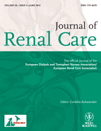
Journal of Renal Care
Inspiring breakthroughs in renal healthcare.The Journal of Renal Care, published by Wiley, stands as a leading scholarly platform for researchers, healthcare professionals, and students dedicated to advancements in nephrology and specialized nursing practices. With an impact factor that reflects its high degree of influence in the field—ranking in the Q1 category for Advanced and Specialized Nursing and Q2 for Nephrology based on 2023 metrics—it serves as an essential resource for innovative research and clinical insights. The journal's ISSN (1755-6678) and E-ISSN (1755-6686) facilitate easy access to cutting-edge studies and reviews that have shaped the scope of renal care since its inception in 2006, with a converged publication span extending until 2024. Addressing the pressing challenges within nephrology, this journal fosters a stimulating academic environment, enhancing the quality of patient care through rigorous peer-reviewed research and dialogue. As it continues to contribute significantly to both nursing and medical disciplines, the Journal of Renal Care remains a pivotal source for nurturing knowledge and advancing practice in renal healthcare.
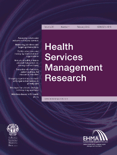
Health Services Management Research
Driving Evidence-Based Solutions in Health ManagementHealth Services Management Research is a premier academic journal published by SAGE PUBLICATIONS LTD, focusing on critical areas within the health policy domain. With an ISSN of 0951-4848 and E-ISSN 1758-1044, this UK-based journal has been a valuable resource for over three decades, converging from 1988 to 2024. Recognized for its contribution to the field, it holds a commendable Q2 quartile ranking, positioning it in the top 35% of journals in Health Policy, reflecting its significant impact within the academic community, as evidenced by its rank of 109 out of 310 in Scopus rankings, placing it in the 65th percentile. The journal aims to foster innovative research that addresses the complexities of health services management, making it an indispensable resource for researchers, professionals, and students dedicated to improving health systems. Although it currently does not offer Open Access, the journal remains committed to advancing knowledge and practice in health policy management through rigorous peer-reviewed articles, case studies, and evidence-based analyses.
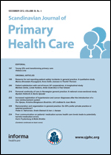
SCANDINAVIAN JOURNAL OF PRIMARY HEALTH CARE
Empowering primary care with accessible knowledge.Scandinavian Journal of Primary Health Care, published by Taylor & Francis Ltd, is a pivotal open-access journal dedicated to advancing the fields of public health and primary care. With its ISSN 0281-3432 and E-ISSN 1502-7724, this journal has made informatics more accessible since its transition to open access in 2014, allowing broader dissemination of knowledge in these vital areas. Covering a wide array of topics, it offers researchers and practitioners a platform to share and discuss original research, systematic reviews, and case studies from 1983 through to 2024. The journal boasts a noteworthy impact factor and holds a Q2 ranking in Public Health, Environmental and Occupational Health, categorized among the top quartiles in its field. With a Scopus rank of #318/665 (52nd percentile), it stands out as a significant resource for stakeholders in the healthcare community. The Scandinavian Journal of Primary Health Care serves not only as a repository of valuable data and findings but also as a catalyst for discussions that promote improved health outcomes across populations.
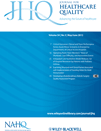
Journal for Healthcare Quality
Inspiring change through impactful healthcare research.Journal for Healthcare Quality, published by Lippincott Williams & Wilkins, serves as a vital platform for disseminating innovative research and insights in the fields of health policy, public health, and medicine. With an ISSN of 1062-2551 and an E-ISSN of 1945-1474, this esteemed journal has been contributing to the improvement of healthcare practices since its inception in 1992. Positioned in the Q3 quartile across its relevant categories as of 2023, it addresses critical issues affecting healthcare quality and policy, demonstrating its commitment to advancing the field. Although it does not currently offer open access, the journal provides researchers and practitioners with an invaluable resource for enhancing their knowledge and practice through peer-reviewed articles aimed at an audience dedicated to improving health outcomes. Located in Philadelphia, the journal continually strives to bridge the gap between research and practical application, making it a cornerstone for those looking to impact healthcare quality.

Journal of Healthcare Leadership
Elevating healthcare management with cutting-edge research.Journal of Healthcare Leadership, published by DOVE MEDICAL PRESS LTD, is a distinguished open-access journal dedicated to advancing the field of healthcare leadership and management since its establishment in 2010. With an ISSN of 1179-3201, this peer-reviewed journal is recognized for its significant impact, currently holding prestigious Q1 quartile rankings in Leadership and Management and Public Health, along with Q2 in Organizational Behavior and Human Resource Management. The journal serves as a vital platform for scholars, practitioners, and students, offering insights into innovative leadership strategies and their implications in the dynamic healthcare environment. Operating from its base in Albany, New Zealand, The Journal of Healthcare Leadership also boasts impressive standings in Scopus rankings, including a top quartile position in Nursing Leadership and Management. With a strong commitment to open access, the journal ensures that high-quality research is readily available to its audience, reinforcing its role as a crucial resource for those aiming to influence healthcare policy, management, and education.

Advances in Simulation
Unlocking New Perspectives in Simulation ScienceAdvances in Simulation is a premier open-access journal published by Springer Nature since 2015, designed to disseminate cutting-edge research and advancements within the realms of simulation across diverse fields. With a focus on areas such as cognitive and developmental neuroscience, ecology, and psychology, this journal is uniquely positioned at the intersection of various disciplines, as evidenced by its impressive 2023 quartile rankings, which range from Q1 in Ecology, Evolution, Behavior and Systematics to Q2 in Psychiatry and Mental Health. Hailing from the United Kingdom, and supporting an open-access model, Advances in Simulation not only promotes the visibility and accessibility of vital research but also engages a global audience of researchers, professionals, and students. Its significant impact factor underscores its importance in the academic community, making it a vital resource for those interested in the synthesis and advancement of simulation techniques across multiple domains.
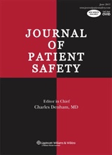
Journal of Patient Safety
Advancing the Standards of Care for Safer PatientsThe Journal of Patient Safety, published by Lippincott Williams & Wilkins, is a premier scholarly journal dedicated to advancing the field of patient safety through empirical research, innovative practices, and critical insights. Established in 2006, this journal has rapidly gained recognition, currently holding a prestigious Q1 ranking in Leadership and Management and a Q2 ranking in Public Health, Environmental and Occupational Health for 2023, reflecting its significant impact within these disciplines. With an impressive rank of #7 in Nursing Leadership and Management and #211 in Medicine Public Health as recorded in Scopus, this journal serves as an essential resource for researchers, healthcare professionals, and students committed to improving patient safety and outcomes. The journal does not operate as an open access publication; however, its comprehensive scope and high-quality articles underscore its dedication to disseminating crucial knowledge in a field that is ever-evolving. Joining the readership of the Journal of Patient Safety means becoming part of a vital conversation aimed at redefining standards of care and enhancing safety protocols across various healthcare settings.
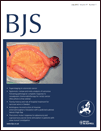
British Journal of Surgery
Transforming surgical practice through rigorous research.The British Journal of Surgery, published by OXFORD UNIV PRESS, stands as a preeminent periodical in the field of surgery, as evidenced by its impressive impact factor and esteemed ranking of #7 out of 551 in the Scopus category of Medicine - Surgery, placing it in the 98th percentile. Since its inception in 1913, the journal has dedicated itself to disseminating cutting-edge research, innovative surgical techniques, and comprehensive meta-analyses, thereby shaping the future of surgical practice and education. With a robust commitment to academic rigor, it has consistently maintained a prestigious position in the Q1 category of surgery as of 2023, affirming its relevance in the modern medical landscape. The journal provides essential access to healthcare professionals, researchers, and students passionate about advancing surgical knowledge and improving patient outcomes. Operated from its headquarters in Oxford, United Kingdom, the British Journal of Surgery is pivotal for anyone looking to stay at the forefront of surgical advancements.